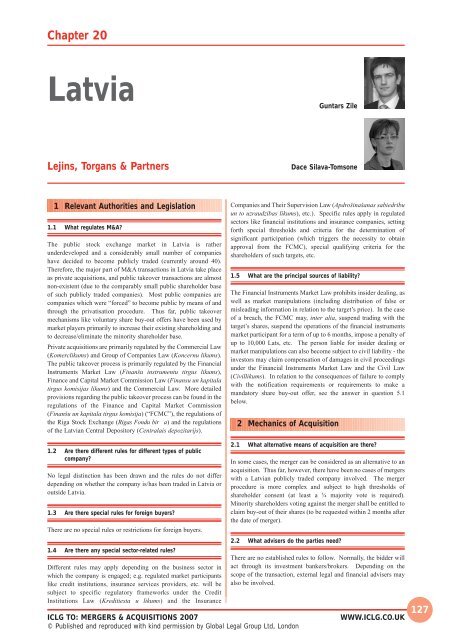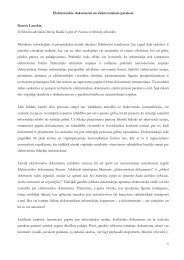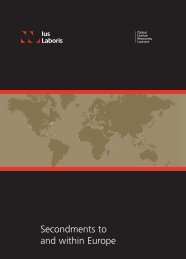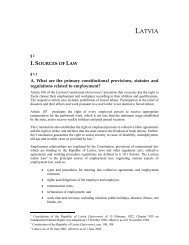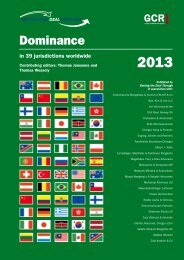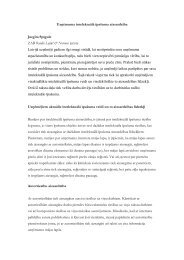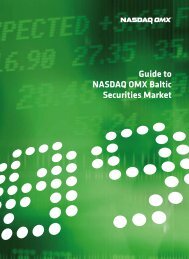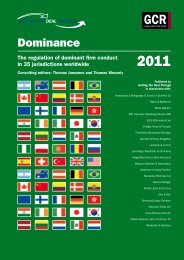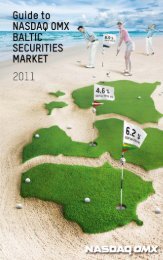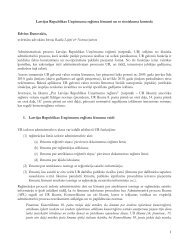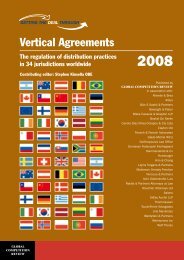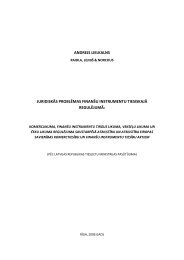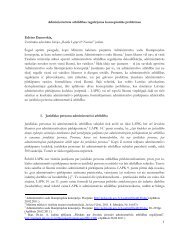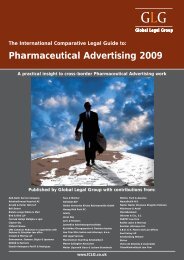Mergers & Acquisitions 2007. Latvia chapter - Raidla Lejins & Norcous
Mergers & Acquisitions 2007. Latvia chapter - Raidla Lejins & Norcous
Mergers & Acquisitions 2007. Latvia chapter - Raidla Lejins & Norcous
You also want an ePaper? Increase the reach of your titles
YUMPU automatically turns print PDFs into web optimized ePapers that Google loves.
Chapter 20<br />
<strong>Latvia</strong><br />
Guntars Zile<br />
<strong>Lejins</strong>, Torgans & Partners<br />
Dace Silava-Tomsone<br />
1 Relevant Authorities and Legislation<br />
1.1 What regulates M&A<br />
The public stock exchange market in <strong>Latvia</strong> is rather<br />
underdeveloped and a considerably small number of companies<br />
have decided to become publicly traded (currently around 40).<br />
Therefore, the major part of M&A transactions in <strong>Latvia</strong> take place<br />
as private acquisitions, and public takeover transactions are almost<br />
non-existent (due to the comparably small public shareholder base<br />
of such publicly traded companies). Most public companies are<br />
companies which were “forced” to become public by means of and<br />
through the privatisation procedure. Thus far, public takeover<br />
mechanisms like voluntary share buy-out offers have been used by<br />
market players primarily to increase their existing shareholding and<br />
to decrease/eliminate the minority shareholder base.<br />
Private acquisitions are primarily regulated by the Commercial Law<br />
(Komerclikums) and Group of Companies Law (Koncernu likums).<br />
The public takeover process is primarily regulated by the Financial<br />
Instruments Market Law (Finanšu instrumentu tirgus likums),<br />
Finance and Capital Market Commission Law (Finansu un kapitala<br />
tirgus komisijas likums) and the Commercial Law. More detailed<br />
provisions regarding the public takeover process can be found in the<br />
regulations of the Finance and Capital Market Commission<br />
(Finanšu un kapitala tirgus komisija) (“FCMC”), the regulations of<br />
the Riga Stock Exchange (Rigas Fondu bira) and the regulations<br />
of the <strong>Latvia</strong>n Central Depository (Centralais depozitarijs).<br />
Companies and Their Supervision Law (Apdrošinašanas sabiedribu<br />
un to uzraudzibas likums), etc.). Specific rules apply in regulated<br />
sectors like financial institutions and insurance companies, setting<br />
forth special thresholds and criteria for the determination of<br />
significant participation (which triggers the necessity to obtain<br />
approval from the FCMC), special qualifying criteria for the<br />
shareholders of such targets, etc.<br />
1.5 What are the principal sources of liability<br />
The Financial Instruments Market Law prohibits insider dealing, as<br />
well as market manipulations (including distribution of false or<br />
misleading information in relation to the target’s price). In the case<br />
of a breach, the FCMC may, inter alia, suspend trading with the<br />
target’s shares, suspend the operations of the financial instruments<br />
market participant for a term of up to 6 months, impose a penalty of<br />
up to 10,000 Lats, etc. The person liable for insider dealing or<br />
market manipulations can also become subject to civil liability - the<br />
investors may claim compensation of damages in civil proceedings<br />
under the Financial Instruments Market Law and the Civil Law<br />
(Civillikums). In relation to the consequences of failure to comply<br />
with the notification requirements or requirements to make a<br />
mandatory share buy-out offer, see the answer in question 5.1<br />
below.<br />
2 Mechanics of Acquisition<br />
1.2 Are there different rules for different types of public<br />
company<br />
No legal distinction has been drawn and the rules do not differ<br />
depending on whether the company is/has been traded in <strong>Latvia</strong> or<br />
outside <strong>Latvia</strong>.<br />
1.3 Are there special rules for foreign buyers<br />
There are no special rules or restrictions for foreign buyers.<br />
1.4 Are there any special sector-related rules<br />
Different rules may apply depending on the business sector in<br />
which the company is engaged; e.g. regulated market participants<br />
like credit institutions, insurance services providers, etc. will be<br />
subject to specific regulatory frameworks under the Credit<br />
Institutions Law (Kreditiestau likums) and the Insurance<br />
ICLG TO: MERGERS & ACQUISITIONS 2007<br />
© Published and reproduced with kind permission by Global Legal Group Ltd, London<br />
2.1 What alternative means of acquisition are there<br />
In some cases, the merger can be considered as an alternative to an<br />
acquisition. Thus far, however, there have been no cases of mergers<br />
with a <strong>Latvia</strong>n publicly traded company involved. The merger<br />
procedure is more complex and subject to high thresholds of<br />
shareholder consent (at least a ¾ majority vote is required).<br />
Minority shareholders voting against the merger shall be entitled to<br />
claim buy-out of their shares (to be requested within 2 months after<br />
the date of merger).<br />
2.2 What advisers do the parties need<br />
There are no established rules to follow. Normally, the bidder will<br />
act through its investment bankers/brokers. Depending on the<br />
scope of the transaction, external legal and financial advisers may<br />
also be involved.<br />
WWW.ICLG.CO.UK<br />
127


